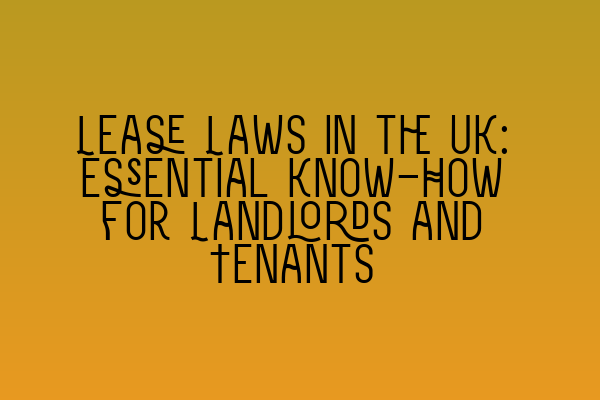Lease Laws in the UK: Essential Know-How for Landlords and Tenants
Leasing property is a common practice in the UK, whether you are a landlord looking to generate rental income or a tenant seeking a place to live or operate a business. Understanding the lease laws is crucial for both parties to ensure a smooth and legally compliant rental agreement. In this article, we will delve into the key aspects of lease laws in the UK and provide essential know-how for landlords and tenants.
The Basics of Lease Laws
In the UK, lease laws govern the legal relationship between landlords and tenants. It is essential to have a written lease agreement that outlines the rights and responsibilities of both parties. This contract should clearly state the duration of the lease, the rent amount, the payment schedule, and any terms and conditions agreed upon. Without a written agreement, disputes can arise, and it can be challenging to resolve them.
Types of Leases
There are different types of leases available in the UK, depending on the property and the intended use. The two most common types are residential leases and commercial leases.
Residential Leases
Residential leases are used for properties rented for residential purposes. These can include houses, apartments, and condos. The law provides certain protections for residential tenants, such as the requirement for landlords to maintain the property in a safe and habitable condition and protection against unfair eviction.
Commercial Leases
Commercial leases are used for properties intended for business use, such as office spaces, retail stores, and industrial premises. Commercial leases often involve more complex terms and conditions, including rent reviews, repairing obligations, and obligations regarding alterations or improvements to the property. It is essential for both landlords and tenants to seek legal advice when entering into a commercial lease to ensure their rights are protected.
Rights and Responsibilities of Landlords
Landlords in the UK have certain rights and responsibilities towards their tenants. It is crucial to understand these obligations to avoid legal issues down the line.
Maintaining the Property
Landlords are responsible for maintaining the property in a safe and habitable condition. This includes ensuring that the property is free from hazards, making necessary repairs, and maintaining essential utilities such as heat and hot water.
Protecting the Tenant’s Deposit
Landlords are required by law to protect their tenant’s deposit in a government-approved deposit protection scheme. This ensures that the deposit is returned to the tenant at the end of the tenancy, minus any agreed deductions for damages or unpaid rent.
Rights and Responsibilities of Tenants
Tenants in the UK also have rights and responsibilities that they must adhere to throughout the tenancy.
Paying Rent on Time
Tenants are responsible for paying the agreed-upon rent on time. Failure to do so can result in legal consequences, including eviction.
Reporting Repairs
Tenants are responsible for reporting any necessary repairs to the landlord promptly. It is crucial to document these requests and any communication with the landlord regarding repairs to have proper evidence in case disputes arise.
Resolving Disputes
Disputes between landlords and tenants can arise at any point during the tenancy. It is advisable to try to resolve these issues through open communication and negotiation. However, if the dispute cannot be resolved amicably, legal assistance may be necessary. There are various legal options available to landlords and tenants to settle disputes, including mediation, arbitration, and court proceedings.
Conclusion
Understanding lease laws is essential for both landlords and tenants in the UK. By familiarizing themselves with their rights and responsibilities, both parties can ensure a smooth and legally compliant rental agreement. Seeking legal advice when entering into a lease agreement, particularly for commercial properties, is highly recommended to mitigate potential risks and disputes. Remember, a well-drafted lease agreement can provide clarity and protection for both parties involved.
Related Articles:
Ethics in Contract Law: Navigating the Moral and Legal Dimensions,
Misrepresentation in Contracts: Unveiling Deceptive Practices,
A Closer Look at SQE Contract Law Syllabus,
SQE Contract Law: Analyzing Landmark Cases and Influential Judicial Decisions,
Contract Law for Services: Key Considerations and Best Practices.
